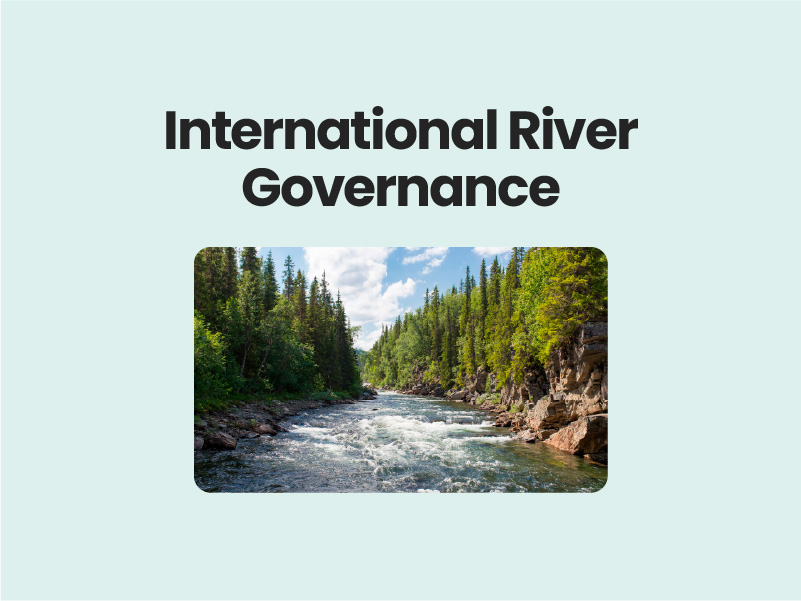Companion@360 → 7 Month programme to sharpen your writing skills → REGISTER NOW

International River Governance
International River Governance – Transboundary water politics in the Ganges-Brahmaputra-Meghna basin are affected not only by inter-government relations between India, Nepal, Bhutan and Bangladesh, but also by dynamics on different scales, including the hydropolitics between Indian states within the basin. At the same time, the disputed issues, and the patterns of power dynamics between actors, are similar in transboundary interactions in the basin as well as in inter-state interactions within India
Both transboundary water disputes and India’s inter-state ones are subject to intense politicking. Within the Indian polity, however, domestic water issues divert political attention away from transboundary ones. Indian states also have significant influence over transboundary water governance, and at times this is at odds with India’s central government.
Significance of Trans-Boundary River Cooperation :
- Understanding how water resources are governed within India should provide insights into the management of transboundary waters.
- There are three reasons for this. First, water disputes within India are more conflictual than transboundaryindeed, hydropolitics between India, Nepal, Bhutan and Bangladesh are highly cooperative in comparison to water interactions between some Indian states.
- This means that domestic disputes attract more political attention within India than do international ones.
- Second, Indian states have significant influence over transboundary water governance, and at times this is at odds with India’s central government.
- Third, the principles that underpin domestic water governance and water conflict resolution between states are reflected in India’s approach to transboundary water issues.
- The Zero-sum attitude to water sharing prevails.At inter-state levels there is a lack of integrative thinking among all parties concerned. This is also a feature of transboundary water interactions in the Ganges-Brahmaputra-Meghna basin. A zero-sum water resource atmosphere is clearly building up in Himalayan Asia.
- Recognition of the importance of transboundary cooperation is a prerequisite for realising the water-related SDG targets and the broader Sustainable Development Goals.
- Transboundary water cooperation can, directly or indirectly, act as a catalyst to improve international trade, economic development, navigation, energy generation, wildlife conservation, and broader regional integration.
Challenges International River Governance
- The decentralised authority over India’s rivers becomes increasingly problematic as the growing demand for water directly contributes to the politics of federalism; the movement towards economic liberalisation in the 2000s has increased federalist competition, as each state has become more responsible for attracting investment and funding its own development efforts.
- Competition is thus one of the causes of inter-state water conflicts in India. The issue of ownership is another cause.
- The question of ownership is posed at different scales: Between the state and communities in general, between the central government and respective states, and between 5 local and state governments. Water ownership, then, is the source of disputes.
- The Indian Constitution does provide for the establishment of tribunals for the resolution of inter-state river water disputes, but in practice this gives the central government no real advantage or manoeuvrability over the states, as it is still constricted by the influence of interest groups and voters.
- These tribunals have been largely ineffective in resolving disputes betweenthe contesting states.
- Without an effective oversight and arbitration mechanism, the interstate water disputes within India are left in a similar position to transboundary water disputes which, because of the anarchic nature of international law, cannot be adjudicated by a higher authority (especially not in the GangesBrahmaputra-Meghna basin, where no River Basin Organisation exists).
- Building dams in the Himalayan region will result in emerging risks like extreme events (floods, droughts), landslides, forest fires and many other ecological threats pose new governance challenges.
- 60% of transboundary river basins worldwide still lack any cooperative arrangement.
- Existing transboundary water treaties and institutions are often weak in terms of their mandate, design, resources, and enforcement mechanisms.
Read Also Mukurthi National Park
Conclusion:
- The influence of Indian states in transboundary water negotiations cannot be ignored. Secondly, Nepal, Bhutan, and Bangladesh must all deal with Indian states in addition to the central government.
- The Indian states are, on the whole, opposed to the creation of a River Basin Organisation in the Ganges-BrahmaputraMeghna basin, and this is a further hurdle for policy-makers interested in this institutional approach to transboundary water governance.
- Zero-sum attitudes are deeply ingrained at both the transboundary and state scales, and policy-makers should focus on enabling positivesum negotiations in addition to taking a water justice approach.
